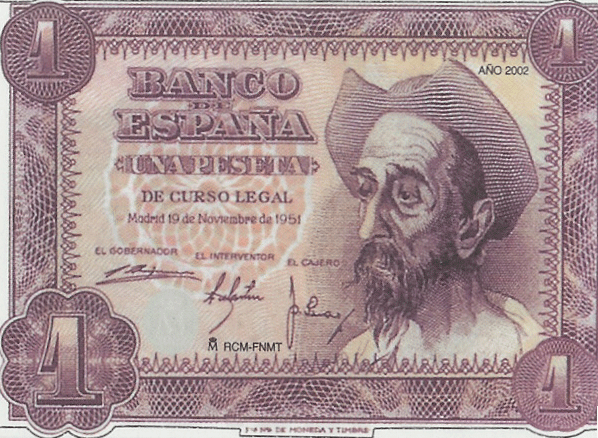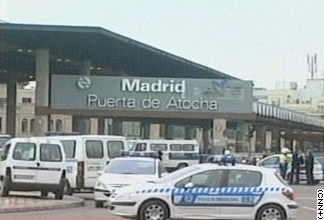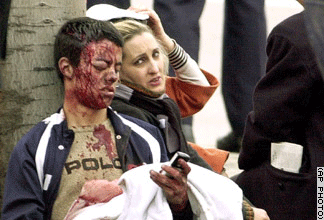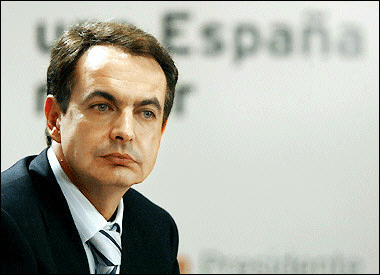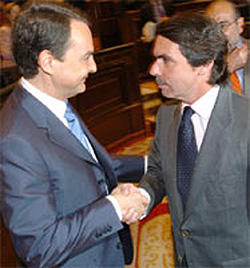Spain
/ España |
Chronology and Information |
COMMON FACTS :
POPULATION: 39,900,000
CAPITAL: Madrid (2,900,000);
PP (Alberto Ruiz Gallardón, 2003-present); PSOE (Leguín, 1991-95);
CDS, (Agustín Rodríguez Sahagún, 1989-91); PSOE (Juan Barranco; 1986-89)
OFFICIAL LANGUAGES: Spanish
(national),
(regional)
Catalá (Catalan) / Catalunya (Catalonia)
Esquera (Basque) / País Vasco (Euskadi; Basque Region)
Galego (dialect of Portuguese) / Galicia
17 COMUNIDADES AUTONOMAS (autonomous regions/states):
Galicia, Asturias, Cantabria, País Vasco, Navarra, Aragón, La
Rioja, Cataluña, Baleares, Valencia, Castilla-La Mancha, Madrid, Castilla
y León, Extremadura, Andalucía, Murcia, Canarias (Ceuta y Melilla:
ciudades españolas en la costa norte de Marruecos)
Before
the Common Era (B.C.E.)
* |
1,500,000-100,000 | (Lower Paleolithic) Human
remains in Iberian Peninsula |
* |
800,000 | Homo Antecessor at Gran Dolina in Sierra de Atapuerca (Burgos): earliest hominids in Europe (distant ancestor to homo sapiens) |
* |
300,000 | Sima de Huesos (near Gran Dolina): massive pit of Homo Antecessor bones. |
* |
100,000-40,000 | (Paleolithic) Neanderthals in caves in Peninsula |
* |
40,000-5,000 | (Upper Paleolithic Age) Cro-Magnons in caves |
* |
18,000 | Cro-Magnon cave painting in Altamira (near Santander), El Pindal (Costa Verde in Asturias) and many other places |
* |
5,000-2,500 | (Neolithic Age) First ceramic products in Iberia. |
* |
2,500-1,700 | Megaliths especially in burial sites. |
* |
1,700-1,300 | (Bronze Age) El Argar culture near Murcia |
* |
1,200-800 | Arrival of Indo-Europeans including
Iberians |
* |
Pre-800 | Dominated
by Iberians (establish Numancia, near Soria) "Toros de Guisando" (near Talavera de la Reina) |
* |
800-400 | Dominated by Celts (celtíberos) |
* |
400-200 | Arrival of Greeks, Phoenecians and Carthaginians in coastal trading centers along Mediterranean. |
* |
237 | Amílcar (Carthaginian) begins conquest of southern Ibernian Peninsula. |
* |
212-200 | Roman conquest of religion, government, language. |
* |
154-133 | Roman war against La Numancia (Celtíberos near Soria) |
* |
122 | Balearic islands conquered by Roman military. |
* |
76 | Gen. Gnaeus Popmpeious Magnus (Pompeyo, 106-48) becomes governor of Hispania Citerior (i.e., north) |
* |
61 | Julius Caesar (Caius Julius; César; 100-44) becomes praetor of Hispania Ulterior (S.). |
* |
49 | César defeats Pompeyo in battle of Ilerda (Lleida / Lérida) |
Common Era (C.E.)
1
C.E. Construction of aqueducts in
Segovia and Tarragona
44
Santiago's (St. James the Major's) body to Spain
70
Jews enter Spain en masse; result of Diaspora
92
Christianity enters Hispania
Ascendancy of Hispanic intellectuals: Marcial, Lucano, Quintillian,
Séneca
96-98
Nerva (32-98), Roman emperor from Spain (first of Antoninos)
98-117
Trajan (52-117), Roman emperor from Spain
100
Population: 6,000,000 to 7,000,000
3 provinces: Lusitania, Baetica, Hispania Citerior
117-138
Adrian (76-138), Roman emperor from Spain
138-161
Tito Aurelio Fulvio (Antonino Pío, 86-161), Roman
emperor from
Spain
161-180
Marcus Aurelius (120-180), Roman emperor from Spain & philosopher
172
Moors invade S. Hispanic (Bética)
180-192
Comodus (Lucius Aurelius), unpopular Roman emperor from Spain and son of Marcus Aurelius
212-409
Prominent part of Roman Empire
314
Hispania divided into provinces: Bética (Andalucía),
Lusitania (Portugal), Carthaginiensis (Murcia / Castilla-La Mancha), Callĺcia
(Galicia), Tarraconensis (Aragón-Catalunya),
Mauritania Tingitania (Morroco)
365
Balearic Is. separate province
409
Conquest by : Suevos, Alanos, Vándalos
409-711
Visigothic kingdom
411
Vándalos Silingos invaded Bética; Vándalos Asdingos
invaded S. Calaecia; Suevos invaded W. Callaecia; Alanos invaded Lusitania
and Cartaginense; Tarraconense remained completely Roman
411
Visigoths invade as allies of Rome and conquer whole peninsula
429
Vándalos leave Hispania and go to Africa
456
Teodorico II (Visigoth from Gaul) invades Hispania for Roman Empire:
destroys the Suevos
460
Visigoths destroy Suevos in Galicia
466
Eurico (Visigothic king) extends reign to Gaul, Lusitania and Tarraconense
475
End of (Western) Roman Empire
587
Conversion to Catholicism by king Recaredo I
AL-ANDALUS
711
Conquest of Iberian Peninsula by North African Moslems (Arabic-speaking
Berbers and Moors; Tariq)
711-1492 Various
Moslem kingdoms in Al Andalus
ASTURIAS
711-718
Unconquered regions in Cantabrian mountains remain unorganized
718-924 Asturias
as independent Christian kingdom
718
Covadonga: First Christian victory of Reconquest by Pelayo over Alcama;
Reconquest lasts until 1492
(Gen. Francisco Franco and Pope John Paul II visit Covadonga)
GALICIA (PORTUGAL)
718
Alfonso I de Asturias annexes Galicia-Portugal
CATALUNYA
800
Charlemagne makes Christian Catalunya into Marca Hispánica
GALICIA
813
Santiago's (Saint James; patron saint of Spain) body discovered in
Compostela (i.e., Santiago de Compostela)
844
Battle of Clavijo ("the Peg") against Andalusian Muslims;
Santiago intervenes
LEON-ASTURIAS
924
León conquers Asturias
ARAGON
925
Navarra conquers (Spanish-speaking) Aragón
CASTILLA
943
Castilla is independent county from León under Fernán
González
AL-ANDALUS / SEFARAD
993-1056 Semue'el
ibn Nagrella ha-Nagid: first poet of "Golden Age" of Judeo-Andalusian
poetry
NAVARRA (ARAGON)
1000-1035
Sancho III el Mayor, strongest Peninsular king
AL-ANDALUS / SEFARAD
1001
Dominance in Al-Andalus of zealot Moslems (Almohades)
c.1022-c.1058 Selomó ibn Gabirol, Judeo-Andalusian poet and philosopher (Málaga -> Córdoba -> Zaragoza -> Granada -> Valencia)
1027
Al Andalus broken up into reinos de taifas
ARAGON
1035
Aragón as separate kingdom under Ramiro
CASTILLA
1035
Castilla is separate kingdom under Fernando I
GALICIA (PORTUGAL)
1071
Alfonso VI de Castillia annexes Galicia (Portugal)
CASTILLA
1083
Christian-Castillian reconquest of Madrid (Magerit)
1085
Christian-Castillian reconquest of Toledo by Alfonso VI
1094-1102
Conquest of Moslem Valencia by Rodrigo Díaz de Vivar - El Cid
(d. 1099)
AL-ANDALUS / SEFARAD
1135 - 1205 Maimonides (Rabbi Moses ben Maimon / Rambam: Córdoba to Cairo): philosopher, physician; 1170-1180, Misheh Torah (Jewish law, in Hebrew); c. 1190, Guide for the Perplexed (faith and reason harmonized, in Arabic)
CATALUNYA
1137
Catalunya joined to kingdom of Aragón by marriage
PORTUGAL
1139
Portugal separates from Castilla leaving Galicia in Castilla-León
CASTILLA
c.1140-1175 El Cantar de mio Cid (Spain's
major epic poem) is written
1212
Castillian victory at Las
Navas de Tolosa (Alfonso VIII, El de Las Navas)
LEON
1230
Kingdom of León united into kingdom of Castilla
ARAGON
1232
Aragón - Catalunya conquers Balearic Islands
CASTILLA
1236
Reconquest of Córdoba by Castilla (San Fernando III)
1248
Reconquest of Sevilla by Castilla (San Fernando III)
1256-74 Castillian
King Alfonso X el Sabio: Translation school in Toledo
c.1285 Composition
of first version of Amadís de Gaula, masterpiece of all Spanish
chivalric romances
ARAGON
1282
Aragón - Catalunya conquers Sicilia
1324
Aragón - Catalunya conquers Cerdeña
1331
Jaime el Conquistador of Kingdom of Aragón conquers Mallorca
from Arabs
CASTILLA
1343
Juan Ruiz writes El libro de buen amor
1348-51
Black plague throughout Spain
1350-69
Rule of Pedro I El Cruel; murdered by half-brother, Enrique de Trastámara
1369-79 Enrique II : first of the house of Trastámara in Castilla
HOUSE
OF TRASTáMARA
1369-1517 The house
of Trastámara rules Castilla
1379-1390 Juan
I de Castilla y León: fought in vain to annex Portugal
1388
Juan I de Castilla makes Asturias principado as part of Castilla
1390-1402 Enrique III
el doliente de Castilla y León
1391
Worst pogroms in history of Spain; massive conversions
1402-1454 Juan
II de Castilla: period of civil wars between monarchy and nobles
ARAGON
1416-1458 Alfonso V
el Magnánimo : his court neopolitan
is a great centre of culture
1442
Aragón - Catalunya conquers Nápoles
CASTILLA
1454-1474 Enrique
IV
1468
Isabel's brother Alfonso dies and Enrique IV recognizes his half-sister
Isabel as heir to throne against his daughter, Juan la Beltraneja
(Pacto de Guisando)
CASTILLA and ARAGON
1469
Isabel, princess of Castilla
marries Fernando II of Aragón
(V of Castilla); Enrique IV is upset, denies Pacto de Guisando, and
civil war breaks out
ARAGON
1469
Fernando el Católico becomes king of Sicilia
CASTILLA
1474 -1504
Isabel I proclaims herself queen of Castilla (daughter of Juan II)
in Segovia; succeeds brother Enrique IV;
1474-1479 Civil war
breaks out again when Juana la Beltraneja gets aid from Portugal
1474
Concordia de Segovia negotiates future harmony between Castilla y Aragón
between Isabel and Fernando
1476
Fernando I of Aragón (Isabel's husband) establishes the Santa
Hermandad, a police organization that patrolled rural areas with the power
of summary justice; later it was established in Castilla too.
1477-1503
Pedro Berruguete and Juan de Flandes flourish (painting)
1478
Isabel I establishes the Inquisition in Castilla
1479
Fernando's troops defeat Juana la Beltraneja and Portugal
ARAGON
1479-1516 Fernando II
(son of Juan II of Aragón) becomes king of Aragón;
THE TWO MONARCHIES ARE PARTIALLY UNITED
CREATING SPAIN
CASTILLA-ARAGON
(Las ESPAñAS)
1492
Jan. 2 Granada surrendered by Bobadilla thus ending Moslem Arab presence
in Iberia
Aug. 3 Jews expelled from Spain and Colón (Columbus) sails from
Palos to the Indies (edict signed March 31, 1492)
Oct. 12 Cristóbal Colón and Martín Alonso Pinzón
"discover" "The Indies"
Antonio de Nebrija presents first grammar of a modern language (Spanish)
to Isabel I
Garci Rodríguez de Montalvo is writing Las sergas de Esplandián
1493-1496
Columbus's second trip : discovers Puerto Rico
1495
Canary Islands conquered
1497
Melilla (Morroco) conquered
1498-1500
Columbus's third trip: discovers more islands and South America
1499
Fernando de Rojas writes La Celestina
1502-1504
Columbus's fourth trip : discovers Central America
1504
Isabel I dies leaving thrown of Castilla to son Felipe I (El Hermoso)
1506
Felipe dies leaving thrown of Castilla to father Fernando (V of Castilla)
Columbus dies in Valladolid
1506-1516 Spain conquers Orán, Bujía and Tripoli (North
Africa)
1508
Amadís de Gaula by Rodríguez de Montalvo published posthumously
1510
Esplandián by Rodríguez de Montalvo published posthumously
NAVARRA
1512
Fernando V conquers Navarra and unites it into Spain
ESPAñA
1516
Fernando V dies leaving regency to Cardinal Cisneros; The Polyglot
Bible published by Cisneros (1514-17)
1517
Carlos, grandson of los reyes católicos
becomes king Carlos I of Spain
Martin Luther begins the Reformation (in
Germany)
HOUSE OF HAPSBURG
1517-1700
CASA DE HABSBURGO (Hapsburg) in Spain
1519
Carlos I becomes Karl V (Carlos V) of the Holy Roman Empire
1519-1521
Hernán Cortés conquers Aztec Empire in México
1519-1522
Fernando de Magalhães and Juan del Cano circumnavigate the globe
1530
Francisco Pizarro conquers Incas in Perú
1540
Francisco de Montejo conquers Mayas in Yucatán
1541
Loyola founds Jesuit Order
1545-1563
Council of Trent ends with Spain beginning the Counter-Reformation
1553 Edición sefardita en lengua ladina (sefardita) en Ferrara, Italia, de la Biblia de Ferrara
1547-1616
Miguel de Cervantes Saavedra
1555
Lazarillo de Tormes (picaresque novel) appears
1556
Carlos I(V) abdicates in favor of his son Felipe II; Carlos dies 1559
1571
Prince Don Juan de Austria (Felipe's half-brother)
wins battle of Lepanto
1575-1580
Cervantes held captive in Algiers
1587-1580 Fray Luis
de León imprisoned by Inquisition in Castilla
PORTUGAL
1580
Portugal and Portuguese Empire integrated into Spain
ESPAñA
1588
Spain's Invincible Armada defeated in English Channel by weather and
Francis Drake
1598
Felipe II dies; Felipe III assumes throne
1605
Cervantes publishes first part of Don Quixote
1609
Moors expelled from Spain
1615
Cervantes publishes second part of Don Quixote
1618-1648
Thirty Years War waged by the Conde Duque de Olivares
1621
Felipe III dies; Felipe IV assumes throne
1620
Tirso de Molina writes El burlador de Sevilla (Don Juan Tenorio)
1630
Pedro Calderón de la Barca writes La vida es sueño
PORTUGAL
1640-1659
Portugal revolts against Spain;
CATALUNYA
